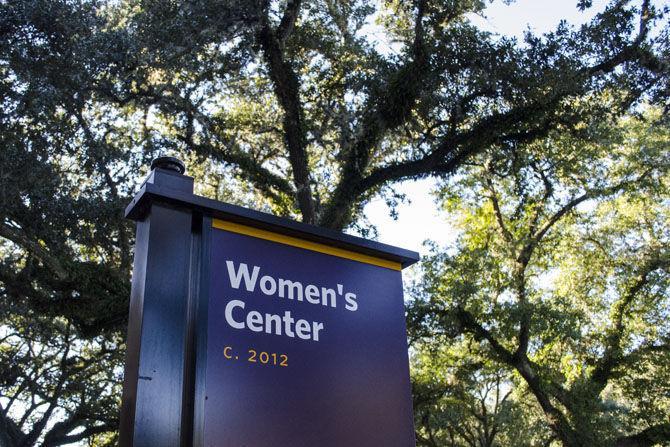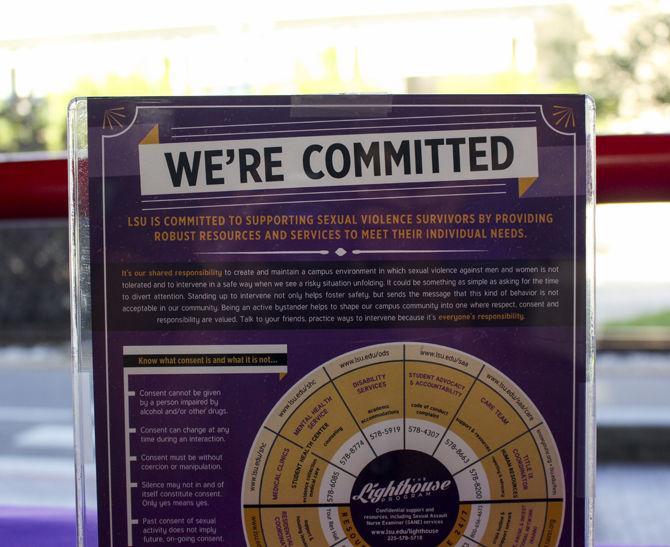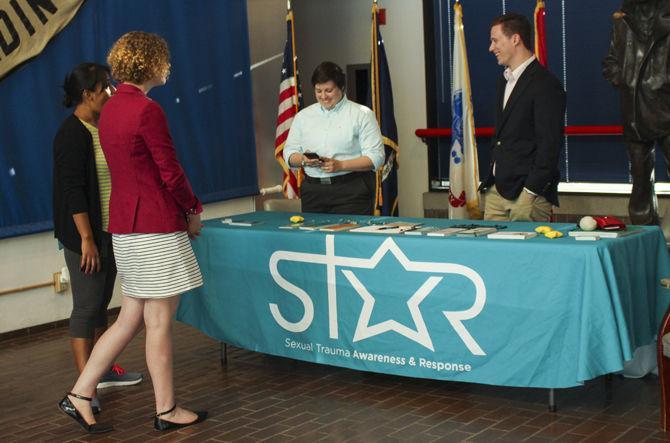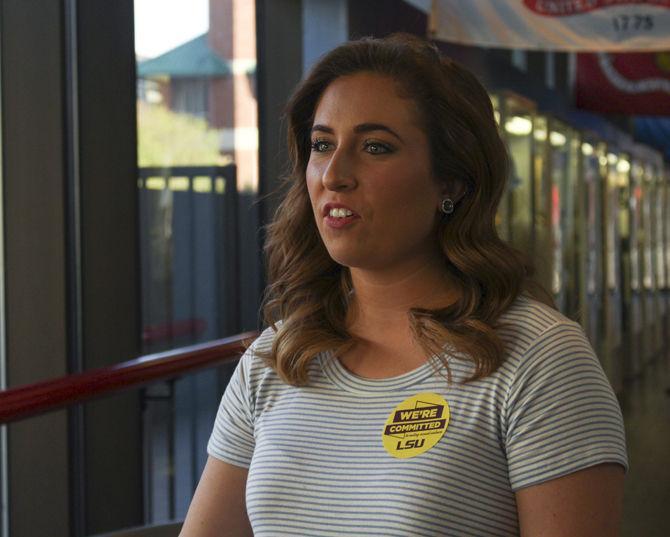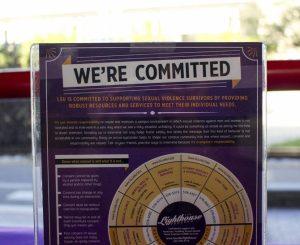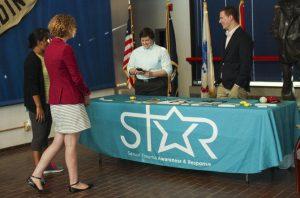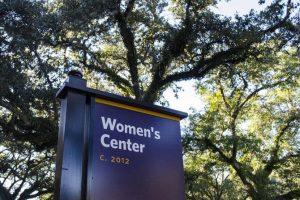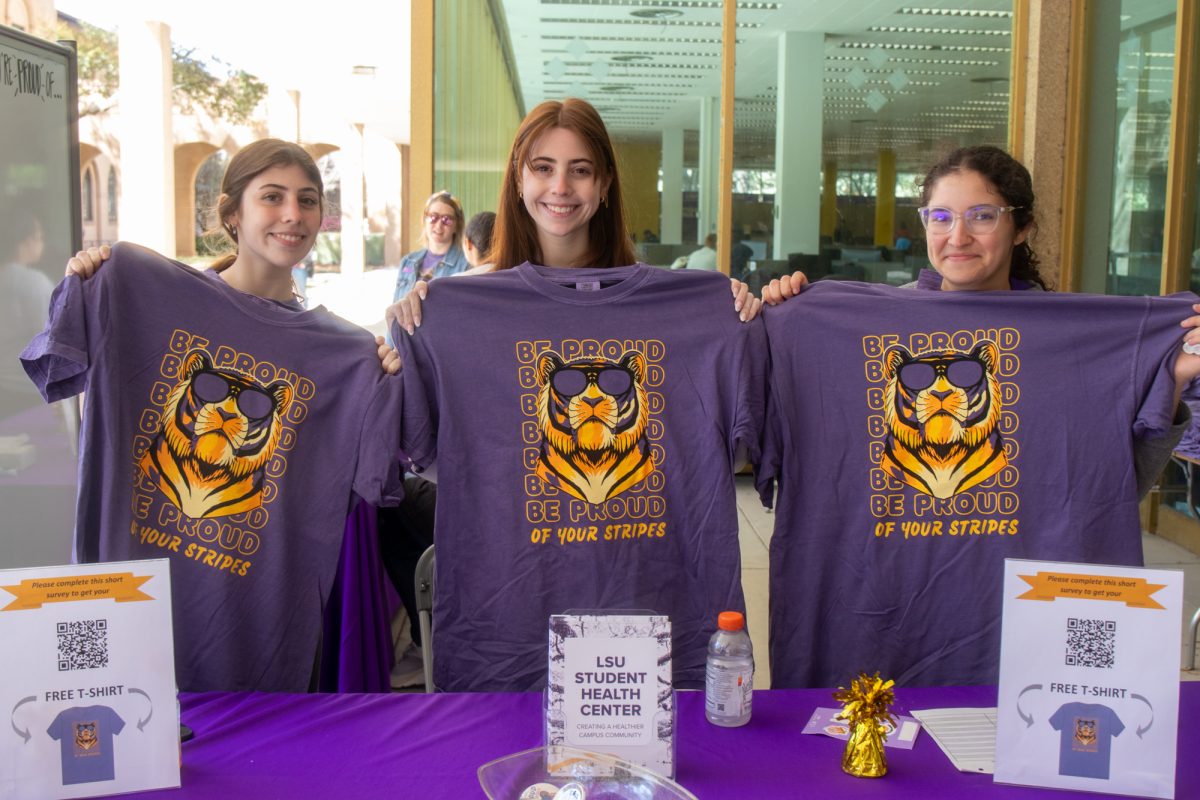One in four women and one in 16 men—that’s how many students will be victims of sexual violence before their college graduation, according to kinesiology senior and We’re Committed advocate Camille Faircloth.
The University works to reduce these statistics and assist survivors through its on-campus resources, including the Lighthouse Program, LSU Women’s Center and We’re Committed initiative.
“I think that by the time it’s 10 years down the line, I’ll look back, and that statistic [will be] one in 10, or that statistic [will be] one in 100 or one in a million,” Faircloth said.
Faircloth was one of the originators of We’re Committed and served as the initiative’s student director for two and a half years. She’s now the senior adviser to the student body president.
The University’s We’re Committed initiative was founded in Spring 2015 in response to former Vice President Joe Biden’s It’s On Us national platform, Faircloth said. The initiative works closely with on-campus partners like LSU Student Government, LSU Student Health Center, Women’s Center, Lighthouse Program, Dean of Students Office, LSU Greek Life, Title IX Coordinators and more.
“We’re Committed is the umbrella over all things encompassing the anti-sexual violence movement at Louisiana State University,” Faircloth said in an email.
The initiative focuses on prevention, intervention and post-vention to combat sexual violence on campus, Faircloth said. For the past three years, We’re Committed has concentrated heavily on post-vention. We’re Committed’s primary resource for post-vention is the Student Health Center’s Lighthouse Program.
The Lighthouse Program is a free and confidential violence prevention, support and advocacy program on campus available to University students experiencing interpersonal violence, according to Assistant Director of Wellness and Health Promotion Susan Bareis, who also coordinates the Lighthouse Program.
Bareis said she assists students by connecting them with resources on and off campus, including medical care, evidence collection, STI testing, mental health services, academic accommodations and safe housing. Bareis also assists students with reporting options, guiding them through the University’s judicial system and the procedure for law enforcement.
The Lighthouse Program stands out among other universities’ programs due to strong ties with several organizations on campus, the Dean of Students, Title IX Coordinators and with University police, Bareis said.
“I think what is unique is that this is a very established program, and we continue to grow and see more students coming to us for resources,” Bareis said.
Bareis said she emphasizes the program’s confidential support to each student, making it clear that students and Lighthouse advocates do not have to report sexual misconduct to the University or law enforcement.
“I really approach it as, ‘Here is a menu of different resource options, support options for you,’” Bareis said. “And, I let the survivor guide the process.”
Bareis said sexual violence is about power and control, and the Lighthouse Program’s goal is to return that power and control to the survivor. Students have the option to use any or all of the options given to them, or they may choose not to explore any further avenues.
The Lighthouse Program is open to all students, even those who experienced sexual violence outside of their college experience, Bareis said. The options provided by the Lighthouse Program also do not expire, so survivors can reach out at any point after the trauma.
“These last few years, we’ve heard more and more cases of sexual assault being reported on campuses, which is great because it’s the most underreported crime in the United States,” Faircloth said.
We’re Committed inspired the creation of the Department of Health and Wellness in Student Government, Faircloth said. This department serves as another post-vention resource for survivors as it focuses largely on mental health issues.
The initiative also connects survivors with off-campus resources, including IRIS Domestic Violence Center, Sexual Trauma Awareness and Response Center (STAR), Crisis Intervention Center, Louisiana Foundation Against Sexual Assault (LFASA), etc.
STAR is a confidential support system for sexual violence survivors operating in the Greater Baton Rouge area, according to the organization’s website. STAR provides services such as confidential advocacy, counseling and legal services at no cost to individuals or families suffering from sexual trauma.
As part of the intervention stage, We’re Committed introduced Tiger Bites, an active bystander program. Tiger Bites is a two-to-three day training program, equipping students with the necessary skills to detect and expose sexual violence before or during an occurrence. The program also educates participants about sexual violence and available resources.
“We’re Committed is all about making this an active topic of conversation,” Faircloth said.
Faircloth said We’re Committed will focus on prevention in 2018, which involves peer-to-peer education about consent, healthy relationships, important definitions and prevalence of sexual violence.
“Peer-to-peer education is the most important and most impactful,” Faircloth said. “The more education we get out about this topic, the more effective it’s going to be.”
The Women’s Center works closely with We’re Committed and the Lighthouse Program, according to Women’s Center Director Summer Steib. The Women’s Center provides survivors with resource referrals, with on-campus and off-campus guides both on hand and online. Apart from her role at the Women’s Center, Steib is also trained as a Lighthouse advocate, she said.
College is a vulnerable period for young adults, rendering students more susceptible to sexual violence, Steib said.
“All crime is really about motive and opportunity, and when you look at a college campus, if there’s a motive, there’s a lot of opportunity there,” Steib said.
Tulane University recently released a Campus Climate Survey, revealing about 40 percent of students responding to the survey had experienced some form of sexual violence while at the university, Steib said.
“So, we know that this impacts a high percentage of students either as direct victims or as friends and associates of folks who are being assaulted in some type of way during their college experience,” Steib said.
Steib said she believes this, as well as the volume of out-of-state students, necessitates specific on-campus programs designed to guide survivors through the difficult process post-trauma. Students not native to Baton Rouge may not be aware of or feel as comfortable using resources available in the Baton Rouge community.
Steib said the Lighthouse Program at the University is set up as a “one-stop shop” available on campus. The program is designed so students can access each step after trauma without leaving or engaging with anyone off-campus, unless they choose to do so. Steib said creating an all-inclusive program simplifies the process.
“I think for a lot of college students figuring out how to navigate the process after trauma, the fewer steps you have to go through, often the easier it is,” Steib said.
The Women’s Center, partnered with the University Council for Gender Equity and the Office of Diversity, will host #MeToo at LSU, a panel discussion about the “climate around sexual assault and harassment for professional women and students,” according to a post on We’re Committed’s Facebook page.
“With all of the attention on the #MeToo movement and with so my critical conversation taking place around sexual assault and harassment, we felt that this was a timely, relevant, and needed discussion for our LSU community,” Steib said in an email.
The panel is part of Closing the Gaps, a campaign launched in December 2015 to address gender gaps on campus, the email said. The #MeToo panel will be the eighth Closing the Gaps panel. The panel will be hosted in the Atchafalaya Room in the LSU Student Union on Feb. 21 from 8 to 9:30 a.m.
LSU committed to reducing sexual violence through various programs
February 7, 2018
LSU’s We’re Committed holds a screening of “Invisible War” and offers resources for sexual assault victims on April 7, 2016 at the Veteran’s Memorial Museum on S River Road.
More to Discover




